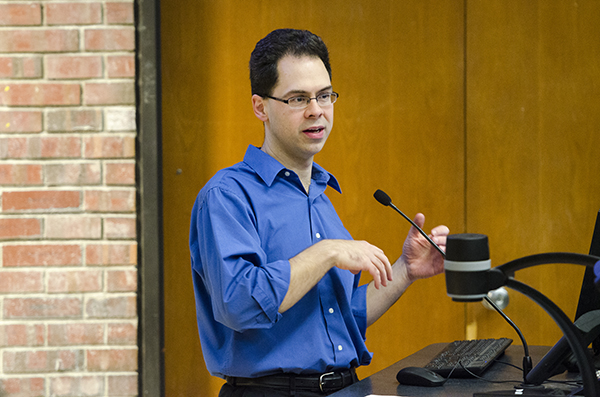

The SUNY New Paltz chapter of the United University Professors (UUP) Union hosted a faculty forum on contingent faculty titled ‘Contingent Faculty at SUNY New Paltz: Where are We Now?’ in Lecture Center 108, Wednesday Oct. 30.
The event coincided with Campus Equity Week, an awareness campaign that takes place every other year on campuses across America during the last week of October and aims to inform the public of the inequity surrounding contingent academic labor, according to UUP’s New Paltz chapter website.
According to UUP, contingent faculty is defined as all those who are not on a tenure track leading to continued employment, a term that can be applied to the majority of people teaching at SUNY New Paltz – more than 300 adjuncts, full-time lecturers, part-time instructors, full-time instructors with term appointments and visiting professors.
The forum provided an open floor for contingent and tenure-track faculty, professionals, chairs, deans and administrators to speak on the topic of contingency in higher education.
The first speaker of the forum was co-chair of the Contingent Concerns Committee of UUP Beth Wilson, who quoted former part-time lecturer in Women, Gender and Sexuality Studies at SUNY New Paltz Suzanne Kelly in her farewell address to the college, where she described her contingent relationship to the school as “one of love and fear.”
Through Kelly’s words, Wilson addressed the fear contingent faculty face when they are unsure of whether or not they will have a classroom to return to in the future.
“Fear runs through my everyday work life like an untamed fire, a fire that all the love in the world cannot seem to put out,” Wilson read. “Fear of whether I’ll have health insurance in the upcoming months, of whether I’ve planned well enough via my other cobbled-together incomes for the upcoming term.”
Wilson went on to discuss the inequity that the institution of higher education promotes by paying faculty through a two-class system of workers, and said that demands must be made of colleges if faculty discrimination is to end.
“If there is a relationship between what professors get paid for the work they do and the value of education, then I hear loud and clear what this institution thinks about education,” Wilson read.
Psychology Professor at New Paltz Douglas Maynard spoke on how tenure track faculty could help contingent faculty better represent themselves in their respective departments and not be overlooked by administration.
“Reaching out to [contingent faculty] to make sure they are welcome at department meeting, social gatherings, making sure knowledge distribution is not limited to the core full-time faculty,” Maynard said.
Maynard said inclusion instead of marginalization in a social organizational sense would allow contingent faculty “more of a voice” were changes that could be made in the present while UUP worked toward increasing contingent salaries.
Chair of the Elementary Education Department Andrea Noel spoke on behalf of junior faculty members in her department, and said that many did not make the wages required to meet their financial obligations. Noel said contingents were being “taken advantage of” and as a result would lead to disadvantages to students and the college as an institution.
“It is ethically correct and morally necessary to support fair pay to all of our colleagues,” Noel said. “It has always been difficult to survive on an adjunct salary but it’s even more difficult now.”
Noel said that this problem has been known for a long time, but administration and faculty have ignored it, herself included. However, during the memorial service of long time adjunct professor Norbert Hellman who died in January, Noel found herself struck with empathy.
“According to the students and faculty who spoke out at Professor Hellman’s service, he was as dedicated and passionate instructor as New Paltz ever had, yet he was never paid a salary commensurate for his service,” Noel said. “An increase from the low $3,000 range to the $5,000 range per course would have made Norbert’s life more comfortable.”
Noel continued.
“I did not know [Hellman] well,” Noel said. “But after his death I felt just awful for ignoring his plight.”
